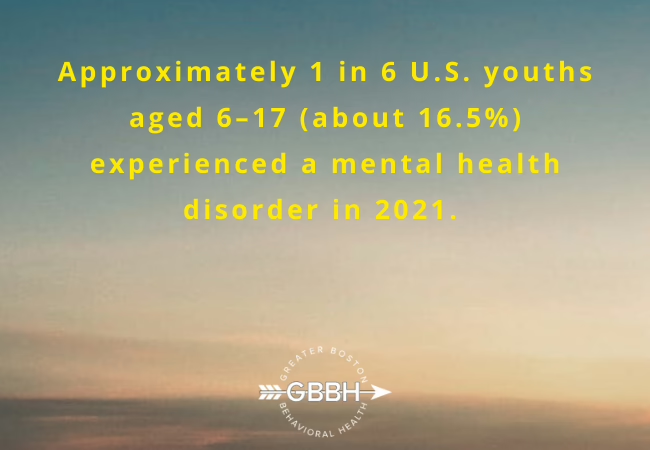Mental health challenges such as anxiety, depression, trauma, and emotional dysregulation can be overwhelming, affecting multiple aspects of a person’s life. While these conditions are common, they can significantly impact relationships, work, and overall well-being. As mental health concerns increase, it’s essential to explore various treatment options that help individuals effectively manage their symptoms and regain control of their emotional health.
One such effective option is the Intensive Outpatient Program (IOP), which offers a structured and supportive treatment plan for individuals dealing with moderate to severe mental health challenges. Intensive Outpatient Programs bridge the gap between traditional outpatient therapy and more intensive inpatient care, providing a valuable treatment option for people who need consistent, intensive therapy but are still able to manage their daily activities, such as work, school, and family responsibilities.
At Greater Boston Behavioral Health, we offer a range of Mental Health Programs Boston, including IOP for individuals struggling with anxiety, depression, trauma, anger, and more. Our goal is to provide a safe, compassionate environment where clients can develop the skills and tools needed to manage mental health symptoms and live a more balanced, fulfilling life.
In this article, we’ll take a deep dive into how Intensive Outpatient Programs (IOP) work, the specific benefits they offer, and why they are an essential part of mental health treatment. Whether you are dealing with anxiety, trauma, depression, or emotional dysregulation, IOP could be the key to supporting your mental health recovery.
What Is an Intensive Outpatient Program (IOP)?
An Intensive Outpatient Program (IOP) is a structured, intensive treatment program for individuals with moderate mental health conditions that require more support than traditional outpatient therapy but do not necessitate inpatient care. IOP typically includes group therapy, individual therapy, psychiatric evaluations, and medication management when necessary.
IOP sessions typically last for 3–4 hours per day, 3–5 days a week, allowing clients to continue living at home while receiving treatment. It is an ideal option for those who are able to manage daily life but need more frequent support to manage their mental health symptoms.
Key Components of IOP:
- Group therapy: Focuses on building social support and learning new coping strategies in a group setting.
- Individual therapy: Provides personalized treatment that addresses the specific concerns and needs of the individual.
- Psychiatric support: Involves medication management or evaluations as needed to ensure clients are receiving holistic care.
- Skills training: Teaches coping strategies, stress management techniques, and emotional regulation skills.
IOP is flexible, offering clients the opportunity to focus on recovery while still engaging in their normal activities, including work or school. This allows individuals to make progress in managing mental health symptoms without fully stepping away from life’s daily responsibilities.
How Do IOPs Help with Mental Health?
Intensive Outpatient Programs are effective for addressing a wide range of mental health conditions, including anxiety, depression, trauma, anger, and more. Here’s how IOPs can benefit individuals struggling with these challenges:
1. Structured Support with Consistent Care
For individuals dealing with anxiety, depression, or emotional dysregulation, having structured, consistent support can make all the difference. IOPs provide the consistency needed to manage severe symptoms. The program’s frequency of therapy sessions helps ensure that clients receive the support they need to process emotions, build coping mechanisms, and reduce symptoms of mental health conditions.
Benefits of Structured Support:
- Regular therapeutic engagement helps individuals stay connected to their treatment process, ensuring that progress is made every week.
- Constant monitoring ensures that any changes in symptoms are addressed quickly, preventing crises from escalating.
- Accountability through regular attendance and participation in group therapy or individual sessions.
2. Therapeutic Interventions and Personalized Care
IOPs use evidence-based therapies like Cognitive Behavioral Therapy (CBT), Dialectical Behavior Therapy (DBT), and Trauma-Focused CBT (TF-CBT) to help clients manage symptoms. These therapies are proven to be effective in addressing common mental health conditions, such as anxiety, depression, anger, and trauma.
- Cognitive Behavioral Therapy (CBT) helps clients identify and challenge negative thought patterns that contribute to anxiety and depression, while also teaching practical strategies to manage those thoughts in real-world situations.
- Dialectical Behavior Therapy (DBT) is particularly effective for managing emotional dysregulation, impulsivity, and interpersonal conflicts. DBT helps individuals develop emotional control and interpersonal skills, which are essential for those with mood instability or Anger Management Therapy Boston needs.
- Trauma-Focused Cognitive Behavioral Therapy (TF-CBT) is a specialized therapy for individuals dealing with trauma or PTSD. It helps clients process traumatic memories in a safe, structured way, promoting emotional healing.
How These Therapies Benefit IOP Clients:
- CBT helps individuals challenge self-defeating thoughts and develop more positive coping mechanisms.
- DBT teaches clients how to regulate overwhelming emotions and reduce harmful behaviors, such as self-harm or substance use.
- Trauma-Focused CBT focuses on addressing trauma symptoms, reducing flashbacks, and improving overall emotional resilience.
3. Group Therapy for Connection and Peer Support
Group therapy is an essential aspect of IOP, offering individuals the opportunity to connect with others who share similar struggles. Group therapy provides a sense of community, reducing feelings of isolation that often come with mental health conditions. It also helps clients learn from others’ experiences and develop new coping strategies.
Benefits of Group Therapy:
- Peer support creates a safe space for individuals to share experiences, listen to others, and find encouragement.
- Learning from peers provides new perspectives and strategies for managing mental health challenges.
- Skill-building occurs as group members practice emotional regulation, communication, and stress management in a collaborative setting.
4. Medication Management and Psychiatric Care
For many individuals, managing mental health symptoms requires more than therapy alone. Medication can play a key role in addressing conditions like anxiety, depression, and mood disorders. Psychiatric support in IOP helps clients receive the proper medications, as well as ongoing evaluation and adjustment based on their progress.
Medication Benefits in IOP:
- Psychiatric evaluations help assess whether medications can help alleviate symptoms.
- Medication management ensures that medications are properly prescribed, monitored, and adjusted for maximum benefit.
- Holistic care: IOP integrates psychiatric support with therapy to address both the mental and physical aspects of mental health.
5. Developing Coping Skills and Emotional Resilience
An important aspect of IOP is teaching clients coping strategies that they can use in their daily lives. These skills help individuals better manage stress, regulate emotions, and cope with challenging situations without resorting to unhealthy behaviors.
Key Coping Skills Learned in IOP:
- Mindfulness: Practicing mindfulness helps individuals stay present in the moment, reducing stress and emotional reactivity.
- Stress management: Clients learn techniques for managing stress in healthy ways, such as relaxation exercises and physical activity.
- Communication skills: Effective communication is taught in group settings and individual sessions, helping individuals navigate relationships and manage conflict.
Who Can Benefit from Intensive Outpatient Programs (IOP)?
IOPs are particularly beneficial for individuals who experience:
- Moderate to severe anxiety or depression
- Emotional dysregulation or mood instability
- Trauma-related symptoms or PTSD
- Anger management difficulties
- Co-occurring disorders, such as mental health and substance use issues
IOPs provide structured care without the need for inpatient hospitalization, making them a great option for those who need significant support while still maintaining their daily responsibilities.
Why Choose Greater Boston Behavioral Health?
At Greater Boston Behavioral Health, we specialize in providing comprehensive Mental Health Programs Boston to individuals at every stage of their mental health journey. Our Intensive Outpatient Program Boston is designed to meet the needs of clients who require more intensive support while still being able to live independently.
Here’s why clients choose us:
- Tailored Care: We create personalized treatment plans that address your unique needs, using evidence-based therapies like CBT, DBT, and Trauma-Focused Therapy.
- Expert Team: Our licensed therapists, psychiatrists, and support staff are dedicated to your mental wellness and recovery.
- Holistic Approach: We integrate therapy, medication management, and skill-building to provide a well-rounded treatment experience.
- Compassionate Environment: We offer a safe, nonjudgmental space where you can focus on healing and growth.
Conclusion
Mental health challenges such as anxiety, depression, trauma, and emotional dysregulation can feel isolating and overwhelming. However, you don’t have to face them alone. Intensive Outpatient Programs (IOP) offer a vital resource for individuals needing more structured, intensive support while maintaining the flexibility to live at home and manage daily responsibilities.
Through a combination of personalized therapy, psychiatric care, and group support, IOPs empower individuals to address the root causes of their mental health concerns, develop healthy coping strategies, and build long-term emotional resilience. Whether you’re struggling with anxiety, depression, anger, or trauma, Greater Boston Behavioral Health is here to help you every step of the way.
By choosing an Intensive Outpatient Program Boston, you’re taking a proactive approach to your mental health. Our team of experienced therapists, psychiatrists, and support staff are committed to providing compassionate, evidence-based care designed to foster lasting recovery and well-being. Don’t wait for symptoms to worsen—take control of your mental health today. Reach out to Greater Boston Behavioral Health and start your journey toward healing, clarity, and emotional stability. Call Greater Boston Behavioral Health at 888.278.0716 today and take the first step toward lasting mental wellness. Together, we can help you regain the balance you deserve.
Frequently Asked Questions (FAQ)
What is an Intensive Outpatient Program (IOP)?
An Intensive Outpatient Program (IOP) is a structured mental health treatment program where individuals attend therapy multiple times a week for several hours a day. It provides more support than traditional outpatient therapy but allows clients to live at home and manage their daily responsibilities.
How is IOP different from outpatient therapy?
While outpatient therapy typically involves weekly therapy sessions, IOP offers more frequent treatment (3–5 days a week) and is designed for individuals who need additional support due to more severe symptoms. IOPs involve a combination of individual therapy, group therapy, and psychiatric support.
What are the benefits of IOP for mental health?
IOP provides structured support and therapeutic care while allowing individuals to live at home. It includes intensive treatment that helps manage symptoms of anxiety, depression, trauma, and emotional dysregulation, as well as valuable skills-building and coping strategies.
Who can benefit from an IOP?
Individuals with moderate to severe symptoms of anxiety, depression, trauma, or anger management can benefit from IOP. It’s ideal for those who need more support than weekly therapy but don’t require inpatient care or hospitalization.
Does IOP include psychiatric support?
Yes. IOPs often include psychiatric evaluations and medication management as part of the treatment plan. A psychiatric team works with therapists to ensure clients receive the appropriate medication for conditions like anxiety, depression, or mood disorders.
How long does an IOP typically last?
The duration of an Intensive Outpatient Program typically ranges from 6 to 12 weeks. The program’s length depends on the individual’s progress and needs. As clients progress, they may step down to less intensive levels of care, such as traditional outpatient therapy.
What types of therapy are used in IOP?
CBT (Cognitive Behavioral Therapy), DBT (Dialectical Behavior Therapy), Trauma-Focused CBT, and mindfulness-based therapies are commonly used in IOP. These evidence-based treatments help individuals manage emotions, develop healthy coping skills, and address issues like trauma and emotional dysregulation.


